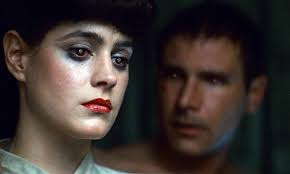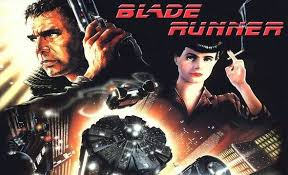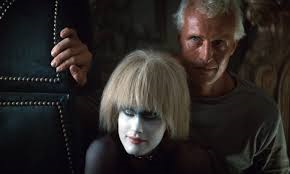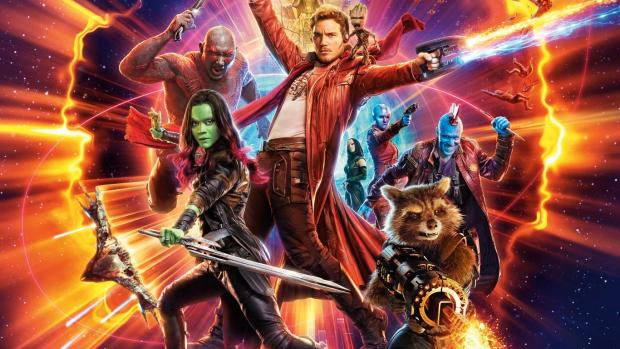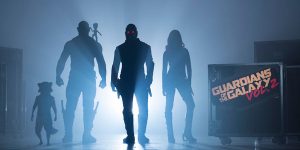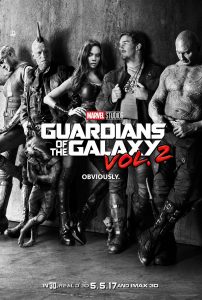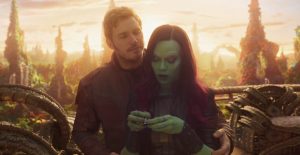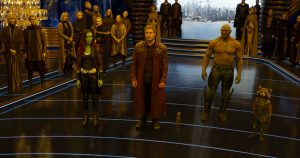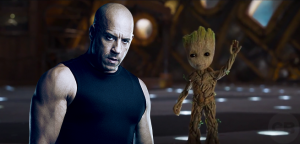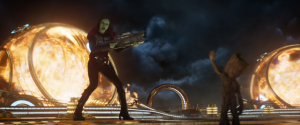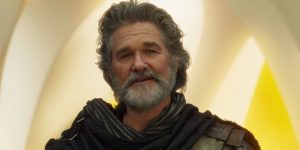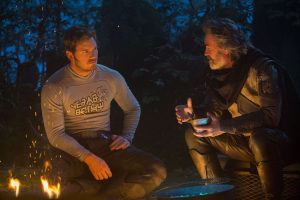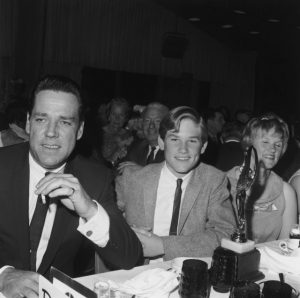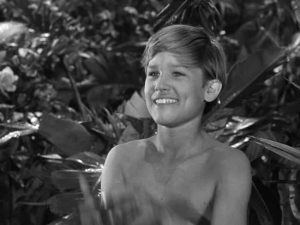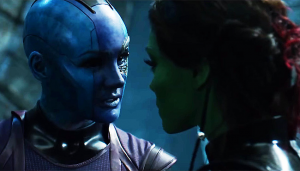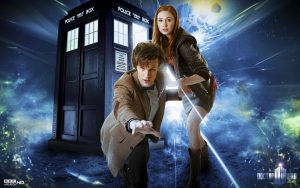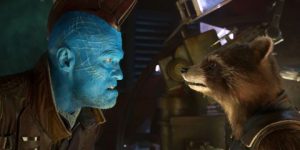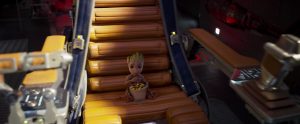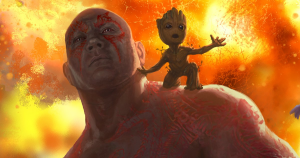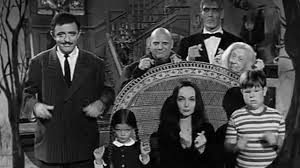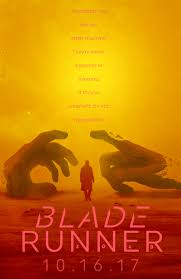
SHORT TAKE:
Sequel to Ridley Scott’s 1982 release – Blade Runner – Denis Villeneuve’s Blade Runner 2049 is visually stunning as it continues in the original’s futuristic neo-noir style, picking up 30 years after the end of the first Blade Runner. Despite plot holes, preposterous coincidences required to propel the story and some internal contradictions, it is an interesting adult viewing if you don’t mind watching a movie the way one might stop and contemplate a mesmerizing painting at a museum.
LONG TAKE:
I will try to avoid revealing anything in Blade Runner 2049 that is not shown in the trailer.
FULL SPOILERS FOR THE ORIGINAL BLADE RUNNER: The original Blade Runner, which came out in 1982, had a clear plot: replicants, self aware engineered human appearing creatures – Pris (Darryl Hannah), Roy (Rutger Hauer) and others – have limited 4 year life spans but extraordinary strength, speed and intelligence. They become “disenchanted” with being slaves on off planet colonies. They revolt, kill their keepers and come to Earth seeking to have their lives extended by their makers. When their Creator – Tyrell – either won’t or can’t upgrade them, they kill him. Deckard (Harrison Ford), the Blade Runner/replicant killer hunts them down and “retires” them one by one. Eventually in a face to face confrontation Roy gains the upper hand but in a final act of mercy, saves Deckard’s life by preventing him from falling off a building. Then, like a clockwork toy, Roy runs out of time and simply expires. Deckard runs away with Rachael, who is a replicant without the life span limit. The movie ends with their fate unknown and a final question unanswered – was Deckard a human or another replicant? Essentially a Bogart-like detective noir film including femme fatale and cynical narration by the protagonist updated to a dystopian future with flying cars and hologram advertisements in a depressing (“Hong Kong on a bad day” to quote director Ridley Scott) cityscape where it is always raining.
The story line of Blade Runner’s sequel, Blade Runner: 2049 is not quite as easy to follow.
While there are some spoiler-ish comments I need to make I will try to negotiate the territory between being too oblique and revealing secrets but not ruining any serious plot points. This will, unfortunately require some vaguery on my part.

The new 2017 Blade Runner: 2049 starts similarly to the original, where the new blade runner, K (later called Joe) (Ryan Gosling), hunts down a rogue replicant. The replicant is hiding out in an unforgiving barren area raising grubs on a protein farm. If you couldn’t figure out Joe was a replicant within the first 45 seconds from his conversation with Joshi (Robin Wright) his handler/boss, then the beating Joe survives while bringing down 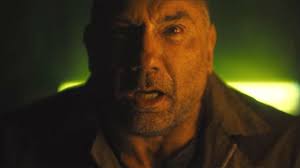 Dave Bautista’s character Sapper would definitely be a clue.
Dave Bautista’s character Sapper would definitely be a clue.
The subsequent plot is dependent on so many wildly unlikely coincidences that when it turns out there is no mastermind leaving bread crumbs it leaves one with a sense of disillusionment about their universe.
And although I appreciate a script writer who trusts their audience to accept certain unfamiliar details which make up the background to any futuristic, or sci fi story, there is a fine line between not spelling out everything and not explaining what the heck is going on.
An example of the puzzling backdrop is the “debriefing” Joe gets when he returns. He sits in an empty room and is barraged with a series of sentences to which he repeats certain words and phrases. Joshi comments afterwards on the results of his debriefing as good. But there is little context for the audience to appreciate what it means so that later, when Joe has a “bad” debriefing, I really couldn’t tell the difference. There were no hints as to what the debriefing meant so Joshi’s reference to a possible extreme reprisal for a continued inability to follow the “baseline” really didn’t mean anything to us. A little background would have gone a long way to making the test results have more impact.

Elsewhere, the megalomaniac brilliant inventor of the modern replicants – Wallace (Jared Leto) – wildly successful, wealthy, and powerful, meets one of his new “born” replicants. He monologues to his female psycho hench woman, Luv, about how difficult it is to make enough replicants and how he thinks of them as his children, then coldly stabs the helpless newly formed replicant to death. OK, I get it, the guy’s a genius nutburger, but the track of his soliloque just was not tending in that direction so her death was more confusing than shocking and there was certainly no sense of suspense.
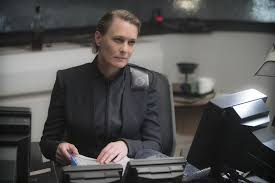 There is a secret revealed by Joe’s unique abilities in a preposterous series of events which sets the majority of the plot in motion. Joshi is horrified but it is obviously something that Wallace would want to make use of. Joe is tasked by Joshi to root out the source. Neither Joshi nor Wallace have the moral ground in this. One wants to destroy an innocent, the other exploit that innocent to enhance their culture’s slave society. Joshi’s concern about “the secret” and Wallace’s desire to foster it seem to be at odds, which is another point of confusion as Wallace seems to be in a position to control everything including the police, making all the subsequent cloak and dagger of the rest of the movie unnecessary.
There is a secret revealed by Joe’s unique abilities in a preposterous series of events which sets the majority of the plot in motion. Joshi is horrified but it is obviously something that Wallace would want to make use of. Joe is tasked by Joshi to root out the source. Neither Joshi nor Wallace have the moral ground in this. One wants to destroy an innocent, the other exploit that innocent to enhance their culture’s slave society. Joshi’s concern about “the secret” and Wallace’s desire to foster it seem to be at odds, which is another point of confusion as Wallace seems to be in a position to control everything including the police, making all the subsequent cloak and dagger of the rest of the movie unnecessary.
Further, given the entrenched class structure of this casually cruel society, I was unconvinced that the revelation of the secret to the public would have had the kind of dire consequences which would make the extremes to which Joshi asks Joe to go be required. Conversely, the attention Joshi brings to the “secret” by sending Joe after the source creates the very problem she claims to want to avoid. No exposition is offered to clarify any of these points relating to the “secret”.
Also, there is some debate as to whether the use of this “secret” which Wallace so wants to capture would aid or destroy his empire. AND – it is unclear how Wallace found out about this “secret”. Either he has so much access to so much information that he would already know where this “secret” is or he would not even know about the “secret” much less Joe’s involvement in it. Either Wallace is borderline omniscient or he isn’t – make up your mind. And what is it with his eyes? Is HE supposed to be some kind of replicant that perhaps Tyrell created – which would explain his inside information, gifted research abilities AND weird eyes – but this potential plot point is never so much as hinted at.
K is supposed to be a “new” replicant which is designed to obey. But later K doesn’t always obey and even lies to Joshi.

The replicant hench woman of Wallace, Luv, cries when Wallace kills a replicant but then is randomly and pointlessly cruel, including to other replicants. This cruelty is not instructed by Wallace nor inherent in replicants. If the replicants of this era are supposed to be held in such a tight rein of obedience these acts make no sense.
Joe fakes another character’s death then brings that character to an extremely high surveillance area to meet someone important to the Wallace corporation. This would be like taking someone in the witness protection program on a tour of the White House and encouraging them to sneak into the Oval Office to say “Hi” to President Trump and expect their identity will remain a secret.
There are other similarly nonsensical actions taken by characters which left me wondering if the writers thought the amazing scenery would distract sufficiently from the sloppy plot points.

HOWEVER – These critiques are not to say that Blade Runner: 2049 is not a decent to good movie. The visuals alone are worth the price of admission. Villeneuve faithfully recreates Ridley Scott’s vision, ambiance, and mood. The acting is stylized but excellent, especially Gosling. 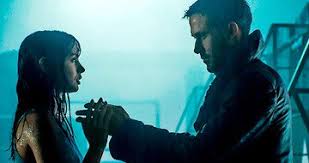
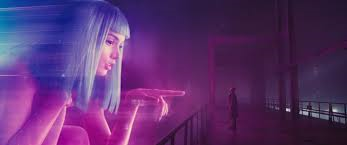 He does a lot despite his character’s inherent reluctance to express much obvious emotion.
He does a lot despite his character’s inherent reluctance to express much obvious emotion.
And those of us with serious trivia issues will note that one very poignant moment in Blade Runner: 2049 features music from an equally poignant moment from the original Blade Runner. I won’t say the name of the bit of music as that would be telling, but fans of the first outing should recognize it when it happens. (If you REALLY want to know I will spoiler below.)
It is a stunning, surreal world which director Denis Villeneuve creates. But anyone expecting a rollicking sci fi the likes of Guardians of the Galaxy or Star Wars will likely fall asleep. The pacing is that of a performance artist whose every movement is intended to mean something so strikes poses and stands, statue-like, long enough for their audience to appreciate and think about what they are seeing.
There is a good deal of gory violence though the worst is done out of visual sight. There is some profanity, graphic moments of sex seen through almost opaque windows and a lot of naked holograms whose full frontal is frequently avoided only by inches.
The Blade Runner universe is a specific genre in science fiction – ground breaking in 1982, somewhat derivative in 2017. And while my viewing companions thought the movie had a clean ending, I thought the writer left major opportunities begging for another sequel.
Hope I have been sufficiently vague enough to prevent giving away too much to this peculiarly engrossing yet perplexingly convoluted story.
And OK – this seriously annoyed movie mavin mom will give one BIG SPOILER … more like an UN-SPOILER ——– duly ignoring Ridley Scott’s pronouncement as just another opinion despite the fact he was the original film’s director — after 30 years of waiting we STILL do not definitively know whether Deckard is a replicant or not!!!!!! ARGGGGGH!

MUSIC RELATED SPOILER – BIG SPOILERS – BIG BIG SPOILERS – BE SURE YOU HAVE EITHER SEEN 2049 OR DO NOT CARE IF MAJOR PLOT POINTS ARE REVEALED TO YOU —- OK – YOU HAVE BEEN WARNED: The "Tears in the Rain" motif by Vangelis, played when Roy dies at the end of Blade Runner is again heard when Joe, seriously (mortally??) wounded, lies on steps leading up to the building into which he has sent Deckard to look for his daughter. He stares, wistfully, up into the falling snow. We are left wondering if Joe will die. Deckard does not know how badly Joe has been hurt but Joe has survived some savage injuries during the course of the movie so……?

